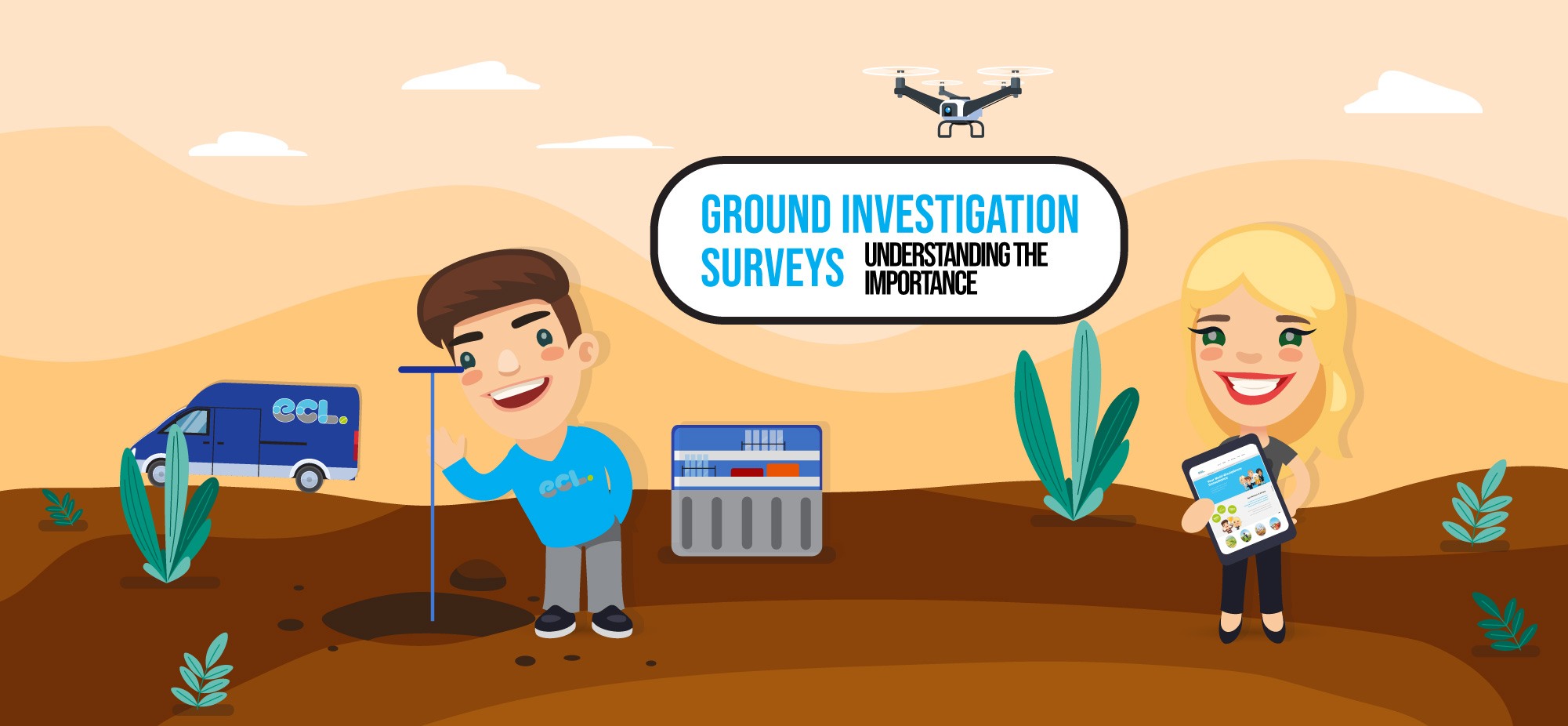Ground Investigation Surveys: Understanding the Importance
Ground Investigation Surveys are an essential step in the Environmental Permitting, Environmental Planning and Development process and are crucial for ensuring the safety and stability of a structure or understanding the ground conditions of construction projects or permitted installations.
In this article, we’ll establish what Ground Investigation is, explore who requires ground investigation services and explain how a survey is conducted.

What Is Ground Investigation?
Ground investigation, also known as Site Investigation, is the process of gathering information about the ground conditions at a specific location. They cover two main areas:
Geo-Environmental Investigations: For the assessment of potential contamination and its potential to cause harm to sensitive human and environmental receptors
Geo-Technical Investigations: This type of investigation is typically conducted when planning to construct a building or other structure on the site.
These involve conducting thorough assessments of a site and its history to:
- understand the characteristics of the soil and rock beneath the surface
- determine its physical and chemical characteristics
- discover any geotechnical abnormalities
- identify any potential environmental hazards, risks and liabilities associated with the site.
- Identify any potential hazards or issues that may impact the construction of a structure.
An Intrusive site investigation involves the physical excavation of the soil and rock layers to collect samples and make observations.
This can be done using a variety of methods, including drilling, digging trial pits, and conducting borehole tests. The depth and extent of the investigation will depend on the specific needs of the project and the nature of the site.
An Intrusive site investigation can also provide valuable information about the geotechnical properties of the soil and rock, such as its strength, stiffness, and compressibility. This information can also be used to calculate the bearing capacity of the soil, which is an important factor in the design of the foundation and other structural elements.
Ground investigation surveys are typically conducted before construction begins, but they can also be carried out during or after construction if necessary.
Who Requires Ground Investigation Services?
Ground investigation services are typically required by construction companies, engineering firms, and government agencies.
However, anyone who is planning to construct a new building, bridge, or other structure on a specific site will likely require a ground investigation survey.
Why Are Ground Investigation Surveys Important?
A ground investigation survey is important for a number of reasons.
Professor Stuart Littlejohn is oftentimes quoted saying “You’ll end up paying for a decent site investigation – whether you have one or not”
Not only do they provide valuable information about the ground conditions that can be used to design and construct a safe and stable structure, they help identify any potential hazards or issues that may need to be addressed before construction begins.
The consequences of poor site investigation, or lack thereof can range from the undesirable increased costs and delays to the catastrophic, such as structural collapse or failure.
Inadequate data gathering at the start of the Environmental Permitting process and throughout a sites operational lifespan can result in increased cost and liabilities or even failure to surrender an Environmental Permit.
Site investigation is necessary for operators of permitted activities for compliance with environmental regulations. In many cases, environmental laws and regulations require that certain steps be taken to assess and manage the potential environmental impacts of a site and your operations.
By conducting a thorough site investigation at the pre-application stage of a development process, environmental consultants can establish the baseline site condition, to ensure operators are not taking on liability for historic contamination and to ensure that they are meeting their legal requirements during the operational process of their site.
What Are The Benefits Of Ground Investigation?
One of the key benefits of intrusive site investigation and ground investigation surveys is they allow for the collection of detailed and accurate information about the subsurface conditions. This can help to identify potential problems, such as unstable soil conditions or underground water sources, and inform the design of the foundation and other structural elements.
Thorough ground investigation and Environmental Due Diligence allows us, as environmental consultants, to gather the necessary information to develop an accurate understanding of the site and its potential environmental impacts through the Conceptual Site Model (“CSM”).
This information is critical for determining the appropriate course of action for managing and mitigating any potential environmental risks.
Site investigation also helps to identify any potential hazards or risks that may be present on the site. This can include things like contaminated soil, groundwater, or ground gases, as well as risks associated with natural hazards such as earthquakes or landslides or abnormal geotechnical properties.
By identifying these hazards and risks, we can develop strategies for addressing them and minimizing their potential impacts.

How Do You Conduct A Ground Investigation Survey?
Conducting a ground investigation survey typically involves several steps. These include:
- Planning: The first step in conducting a ground investigation survey is to plan the survey. This includes determining the scope, selecting the appropriate survey techniques, and identifying any potential hazards or issues that may need to be addressed.
- Fieldwork: The next step is to conduct the fieldwork. This typically involves taking soil and rock samples, as well as conducting a variety of tests and measurements to gather information about the ground conditions.
- Analysis: After the fieldwork is completed, the data is analysed to understand the characteristics of the soil and rock beneath the surface.
- Reporting: The final step is to report the findings of the survey. This Ground Investigation report (GIR) will typically include an overview of the ground conditions, as well as any potential hazards or issues that were identified during the survey.
How Can ECL’s Ground Investigation Services Help You?
Our ECL Environmental Consultants can help in a number of ways.
Our team of experienced professionals are equipped with the knowledge, expertise and experience of conducting hundreds of thorough ground investigation surveys, including Phase 1 Assessments, Phase 2 Intrusive Investigations, and Waste Characterisation / Waste Acceptance Testing using the latest technology and techniques to gather the most accurate and reliable data.
The ECL team can provide the analysis and interpretation of data to help you understand the ground conditions and any potential hazards or issues that may impact your construction project.
Our network of local offices across the UK, in Cardiff (Wales), Leeds (West Yorkshire), Newcastle and the Birmingham (West Midlands), allow ECL to provide a cost-effective service nationwide. Servicing all project sizes from small business to large corporate infrastructure projects.
Fill out our ECL Enquiry Form or call us on 01443 841760 for any queries regarding Planning Applications, Ground Investigation, and Site Investigation Surveys.

